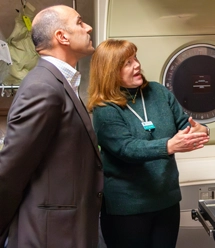
Summer is underway and with that comes the August congressional recess when members of Congress will be looking for opportunities in their states and districts to meet with constituents and learn about their issues. This is a great opportunity to invite your elected officials to tour your radiation oncology facility and in turn help build momentum for ASTRO’s legislative priorities.
Clinic tours have an incredible ability to educate members of Congress about the value of radiation oncology. They give members a firsthand view of the impact of their decisions on health care. Within the last year, two of the lead sponsors of the Radiation Oncology Case Rate Value-Based Payment Program Act (ROCR Act) (S. 4303 / H.R.8404) visited radiation oncology clinics and were heavily influenced by what they learned.
In January, Coastal Radiation Oncology Medical Group physicians Lauren Tait, MD, and Ben Wilkinson, MD, hosted a tour of their Templeton Radiation Oncology Center for U.S. Congressman Jimmy Panetta (D-CA), a cosponsor of the ROCR Act.

"When I lived closer to DC, Advocacy Day was always something much easier to attend, but now that I live in California, I have been wondering how our practices could still be involved in the important work done through the ASTRO,” said Dr. Wilkinson. “Volunteering to host a congressional site visit was not even on my radar, but when Dave Adler and his team brought it up, I knew it was a way to get one of the clinic teams that I work with every day involved in speaking up for radiation oncology on a national level."
During site tour visits, members of Congress can view impactful technological innovations and the work of dedicated professionals. They also have the opportunity to learn about critical issues in radiation oncology practices and the need for Congress to advance legislation, such as the ROCR Act, prior authorization reform, and cancer research funding increases.

Kristi Garcia explains the treatment process.
Dr. Wilkinson shared a few tips on how to make clinic visits a success and plan for an informative and impactful tour.
Know your member of Congress. This seems like an obvious thing to do before anyone visits your center but reading about the member's background and the issues they care most about can help make your conversation more natural.
Involve your team. Radiation oncology is a team effort. Hearing from the various positions in the office including the front office, nurses/medical assistants, dosimetrists and physicists shows the depth of experience and knowledge required to run a radiation oncology office safely. Many team members enjoy being included in high-level events and including them helps make them feel even more valued well after the congressional visit is over.
Call upon ASTRO Staff to help you prepare. The ASTRO staff is terrific, and they know the issues that we as a specialty are advocating for, including the important statistics. We took time to meet on a video call to hear the background of the legislation we would be promoting. Being well-versed in the background of the legislation you are promoting can engage the congressperson and their aides quickly, in addition to demonstrating that the issues being discussed affect your individual clinic.
Duration. One to two hours is an ideal length for a tour. Make sure to cover the technology and staff that make radiation oncology so unique and valuable.
RO 101. Include a brief overview of radiation oncology to educate your representative about the basics of radiation therapy and its significance in cancer treatment.
Share what matters to patients. Although it is important to emphasize what a high-tech field we are part of and the great things our linear accelerators do, it is also important to speak up for what patients care about. This includes access to care, compassionate staff, safe treatments and positive outcomes. At the Templeton Radiation Oncology Center, highlighting that we have gone through an accreditation process and have an on-site physics staff impressed Representative Panetta and his team.
Patient interaction. If possible, arrange for your representatives to meet with patients. Personal stories and testimonials can be incredibly impactful in conveying the real-world implications of health care policies.
Roll out the welcome mat! Members of Congress visit many various offices and programs their constituents back home care about and invite them to. However, they will likely only remember a few by the time they return to DC. ASTRO patient brochures, business cards, and concise one-pagers ready to hand out (ASTRO staff will help with these) will help leave that lasting impression. Small refreshments including water or soft drinks to take with them on the way to their next stop will likely be welcomed. In our case, even my kids wanted to get involved, drawing a personal picture with a thank you note for visiting our center.
ASTRO encourages clinics to start the process now for scheduling tours for the upcoming August congressional recess. Reach out to the Advocacy Team to help you get started.


